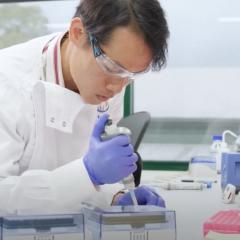The discovery of how tumour cells relate to organs and prepare them for cancer has given University of Queensland researchers a clue to creating an early diagnostic test for ovarian cancer.
UQ Centre for Clinical Research researchers have been examining the role of exosomes and their function in ovarian cancer progression.
Study leader Dr Carlos Salomon said exosomes, which are produced by cells and contain genetic material and proteins, were contributing to the development of ovarian cancer.
“In the past five years, our understanding of how cells communicate with each other in both healthy and diseased states has undergone a significant shift,” Dr Salomon said.
“We now recognise the exosomes' role in inter-cellular signalling.
“They function as messengers, carrying specific information that allows cells to communicate with one another.”
Dr Salomon said that as carriers of protein and genetic material, exosomes were able to alter the genetic makeup of recipient cells.
He said preliminary results showed the tumour cells could release exosomes, which interacted with other organs and prepared them for the spread of the cancer, known as metastasis.
“The capacity for normal cells to invade is very low, so when cancer cells communicate with normal cells, it seems they have the ability to transform the normal cells into cells with high-invasion capacity – preparing for metastasis,” Dr Salomon said.
“If we can characterise the exosome profile of early stage cancer, we can identify individuals with ovarian cancer at an early stage while the disease is still treatable.”
Dr Salomon said he and his team had been able to isolate extracellular vesicles and measure the level of a particular type of exosome.
“This means we can detect early-stage ovarian cancer by looking for a specific type of exosome that tests positive for tumour biomarkers,” he said.
“There is an urgent need for a reliable diagnostic marker to allow for early detection of ovarian cancer.
“This would improve survival rates dramatically, as when the cancer is diagnosed earlier on, women fare a much better chance of a full recovery.”
Exosomes can be acquired from a range of biological fluids, which means a patient may be able to provide a blood, urine or saliva sample to receive a diagnosis for ovarian cancer in the future.
Contact: Kate Sullivan 07 3346 6041, 0438 753 471, k.sullivan4@uq.edu.au



